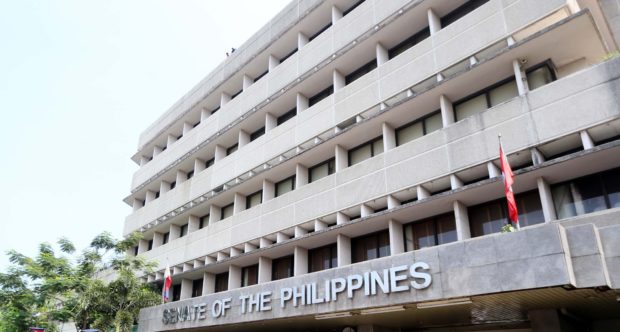Senate probe pushed vs fake eArrival card websites scamming travelers

The Senate building at the GSIS Complex in Pasay City. (Photo by LYN RILLON / Philippine Daily Inquirer)
MANILA, Philippines—Fraudsters using fake websites to collect money for electronic arrival (eArrival) cards have caught the ire of some senators.
Senate Majority Leader Joel Villanueva on Tuesday raised the possibility of a Senate probe after Senator Pia Cayetano brought the issue before the chamber through a privilege speech.
“We support the call of our distinguished colleague, Sen. Pia Cayetano, for perhaps a Senate investigation on the matter to get to the bottom of this particular issue, exact accountability, and put in place necessary measures and even legislation that would prevent this from happening again in the future,” Villanueva said.
In her speech, Cayetano identified the website, “ph.entryform.com,” which she said was asking a fee of $79 or about P4,500 for the issuance of an eArrival card.
“So I don’t know how many people ang naloko dito, but the reality is, for the record, there is no payment required to secure this e-Card. None. Zero. So maliwanag yan. Ang eArrival Card is free of charge,” she stressed.
Article continues after this advertisement“So bakit may ganito? Bakit may raket nang ganito [So why there is something like this, why is there a racket like this]?” Cayetano asked.
Article continues after this advertisementAccording to her, concerned government agencies such as the Department of Tourism and the Department of Health (DOH) were aware of this scam since this was first raised during a hearing last week.
In fact, she said, the DOH has already sought the assistance of the National Bureau of Investigation (NBI) and Google to stop this illegal activity.
“I also on my own have reached out to Google and also made representations that this is damaging, not only to our reputation, but to the pockets of Filipinos and foreigners who would be victims of this scam,” Cayetano said.
After her speech, Deputy Majority Leader JV Ejercito admitted that he has fallen victim to these fake websites.
“Actually, I was also victimized by that last July and I almost missed my flight because of this. Noong nag apply po ako ng e-health pass, dito po ako na-direct so I was also victimized…” said Ejercito, who was then presiding the session.
Also taking the floor, Villanueva informed the body that this One Health Pass (OHP) scam has been going on since early this year or even earlier, citing a travel advisory from the Philippine Consulate General in San Francisco, California issued last March 31, 2022.
He noted also that it was only last November 1 when the OHP was replaced with the eArrival card.
“We checked the fake websites today and note that they are already down,” he said.
Aside from the www.ph-entryform.com earlier mentioned by Cayetano, Villanueva tagged three more fake websites namely: www.philippinesohp.com, www.entranceform-philippines.com, and www.philippines-form.com.
Senator Grace Poe, meanwhile, believes it is now how high time that a single government agency is designated to chase creators and administrators of fake websites.
Aside from the NBI’s Cybercrime Division, Poe noted that the Department of Information and Communications Technology (DICT) has a Cybercrime Investigation and Coordinating Center (CICC), which was given a P274.73-million budget this year.
The Philippine National Police also has an Anti-Cybercrime Group in charge of all ICT-aided crimes, the head of the Senate committee on public services said.
“That’s why it’s confusing, there’s no central government office that you can lodge a complaint to on particular cases like this,” Poe lamented.
According to Poe, the central government body could easily direct concerned agencies to act on the complaints based on their jurisdictions, since these fraudulent companies receive payments through credit card transactions.
“Definitely, there has to be a government agency to direct those banks and credit card companies not to accept or authorize transactions from those fraudulent companies. Maybe that’s an angle we can look at,” she said.
RELATED STORY:
Bato recalls being held for carrying over P10,000 abroad: ‘Baka akala nila construction worker ako’